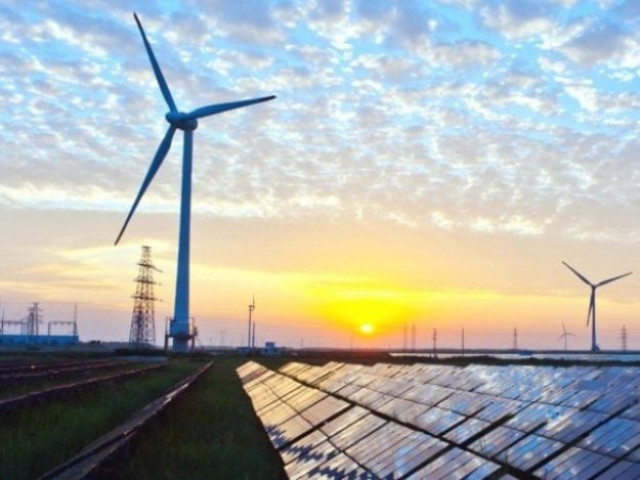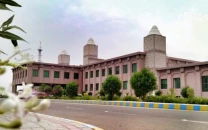Sindh, Balochistan oppose Centre’s renewable energy policy draft
CCI is the appropriate forum to resolve these issues, says Wahab

Mayura Botejue, a consultant on renewable energy projects, was of the opinion that regulatory impediments were one of the main reasons why wind and solar power in Pakistan didn't account for more than five per cent of the total electricity produced in the country. PHOTO: FILE
This was stated in a statement given by Adviser to Sindh Chief Minister on Law and Environment Barrister Murtaza Wahab on Saturday during the 4th International Wind Energy Summit 2019 organised by Energy Update. Wahab, who is also the spokesperson for the Sindh government, said that the Constitution of Pakistan mandated the CCI to take up issues pertaining to energy and power sectors as the Centre could not take unilateral decision on these issues.
CM stresses on alternative energy resources
According to Wahab, issues pertaining to renewable energy projects such as transmission, distribution of electricity produced by them and their tariff determination, should be resolved at CCI's forum with consensus between the Centre and the provinces. The adviser stressed that this is the only method that would ensure a resolution of all issues.
Wahab said that the public-private partnership model would be adopted by the Sindh government to facilitate renewable energy projects. He gave the example of the Thar coal and energy project which had been commissioned under the same model.
According to Wahab, the provincial government is committed to the cause of development and expansion of the renewable energy sector. The adviser cited the establishment of the Sindh Transmission and Dispatch Company saying that it was th first of its kind in the country. He added that both the private sector and the government could ensure maximum generation of clean electricity in the country by combining their resources.
Earlier, Balochistan Energy Secretary Pasand Khan Buledi said that the Balochistan government had reservations over the draft of the new renewable energy policy of the country but the reservations were yet to be addressed by the federal government. He said that according to his province's government, if the policy is implemented in its current shape then it would not be of much use in harnessing the province's potential to generate clean electricity on the basis of wind and solar power.
"Balochistan hasn't produced a single megawatt of clean electricity and situation will not change much if the new renewable energy policy of the country is implemented in its present form without resolving the grievances of the province regarding the policy document," he said.
"You cannot call it a national policy if you cut out half of Pakistan from it," said Buledi while lamenting that Balochistan has not been given special consideration in the draft of the renewable energy policy. He added that this was despite Balochistan having the country's best wind corridor and sites for solar energy projects. "Exploitation of natural resources of Balochistan in the past has not helped in uplifting the socio-economic status of the local population," he said adding that the situation would remain the same in this sector too if the province isn't given due recognition in the new policy.
Buledi said that when the initial draft of the new policy was circulated among the provinces, he and the Balochistan chief minister had written letters to the relevant federal authorities to apprise them of the province's reservations. However, he added, those reservations remained unresolved when the revised draft of the policy was shared with the provinces.
"The provinces are supposed to implement such a policy but in case the provinces are not taken on board while finalising the policy draft then the [federal] government should not complain if the policy is not duly implemented," said Buledi. According to him, the roadmap contained in the draft renewable energy policy for generation and evacuation of alternative electricity did not take into account the potential of solar and wind power of Balochistan.
"We say that if renewable energy policy envisages 20 per cent of electricity generation in the country on the basis of renewable power by the year 2025 while increasing the same ratio to 30 per cent by the year 2030 then each province should know exactly how much clean energy it has to produce to meet this goal under the new policy," he said.
Referring to the potential of his province, Buledi said that up to 170,000 MWs of solar power could be produced if only one per cent of the total land mass of Balochistan was put to use for the purpose.
Brig Tariq Qadir Lakhair of Engro Energy said that Balochistan at present presented the best prospects available in the country for investment in the renewable energy sector. He said that law-enforcement agencies and the Pakistan Army in Balochistan had been providing security to people visiting the province with the intention to do wind and solar energy projects.
Federal govt promises new national energy policy
Mayura Botejue, a consultant on renewable energy projects, was of the opinion that regulatory impediments were one of the main reasons why wind and solar power in Pakistan didn't account for more than five per cent of the total electricity produced in the country.
He said that the government should clearly state its goals regarding expansion of the country's capacity to produce renewable energy. According to him, hybridisation of existing wind power plants is one of the methods to increase production of clean electricity along with the use of improved battery storage technology to harness the potential of solar power.
Naeem Qureshi, chairperson of the organising committee of the summit, said that the wind energy conference was held every year in order to gather all stakeholders of the alternative energy sector under one roof so that they could discuss issues pertaining to clean electricity production in the country.
Published in The Express Tribune, September 1st, 2019.

















COMMENTS
Comments are moderated and generally will be posted if they are on-topic and not abusive.
For more information, please see our Comments FAQ